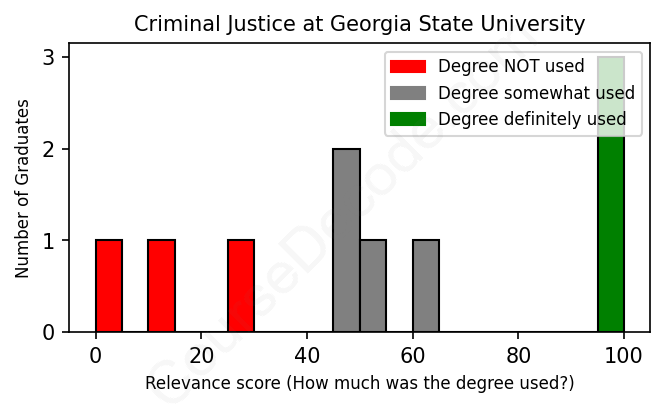
First, some facts. Of the Criminal Justice graduates from Georgia State University we've analyzed , here's how many have used (or NOT used) their degree in their career:

These are estimates based on AI analysis of 10 LinkedIn profiles (see below).
The verdict? Significantly below average. Overall, with an average relevance score of 54%, Criminal Justice graduates from Georgia State University have a much lower likelihood (-13%) of finding work in this field compared to the average graduate across all fields:
And for comparison, here's the chart for all profiles we've looked at across all degrees.
Also, after graduating, only 10% of these graduates have pursued further education other than another Bachelor's degree (such as a Masters degree or other), compared to the average across all profiles of 35%. This suggests a Bachelors degree is enough for most Criminal Justice graduates, and it's normal to look for work straight after graduation.
See the details:
|
Relevance score: 100% We think this person has gone into a career highly relevant to their degree. We think this person has gone into a career highly relevant to their degree.
DEGREE INFOGraduated in 2022 from Georgia State University with a Bachelor's degree in Criminal Justice. Also pursued further education since (see below). JOB HISTORY SINCE GRADUATIONSexual Assault Response Team (SART) Coordinator Mosaic Georgia Dec 2022 - Present Advocacy Specialist  Mosaic Georgia Apr 2023 - Present FURTHER DEGREES DONE SINCE GRADUATINGMaster's degreeGeorgia State University 2023 - 2025 ABOUTNo information provided. |
The top 10 most common jobs done by the graduates we've analyzed (ranked most common to least) are:
When looking at the job paths of graduates from Georgia State University with a degree in Criminal Justice, a mixed bag emerges. Many individuals have landed roles that seem to relate closely to criminal justice principles, like police officers, private investigators, and even positions at various law enforcement agencies. For instance, jobs like the Police Officer at DeKalb County and the Trooper Cadet at Georgia State Patrol cleanly align with the skills learned in their programs. However, there’s also a notable trend of graduates veering towards roles that are either indirectly related or completely unrelated to criminal justice. Some have taken on positions in fields like fitness instruction, retail management, and corporate fraud management—while the last one involves some elements of criminal behavior, it leans more towards business rather than strict law enforcement or criminal justice work.
Overall, it seems like while a good number of folks have pursued and secured jobs that are highly relevant to criminal justice, many others have ended up in positions where their degree might not really come into play. Some of these roles focus more on skills like management or customer service, leaving a gap in leveraging the actual skills and knowledge linked to criminal justice. It's a bit of a mixed blessing, showing that while the degree can open doors in law enforcement and legal spaces, it doesn't exclusively guarantee a career in those fields. It's worth thinking about what interests you and how much that lines up with a Criminal Justice path!
Here is a visual representation of the most common words in job titles for Criminal Justice graduates (this is across all Criminal Justice graduates we've analyzed, not just those who went to Georgia State University):

Looking at the career paths of graduates from Georgia State University who earned a degree in Criminal Justice, it's clear that there are mixed outcomes. Many of these individuals seem to have taken their first jobs in relevant fields, such as internships with law enforcement agencies or positions related to public safety. For instance, some started off as police officers or worked with organizations connected to crime investigation and community safety right after graduation, which is a solid first step for those looking to build a career in criminal justice.
However, as we dig deeper into their careers five to ten years later, there’s a notable trend where a significant number have pivoted away from traditional criminal justice roles. For example, some graduates took on managerial positions in fraud prevention, retail management, and even fitness instruction. While some individuals found their way back to law enforcement or legal fields, others ended up in seemingly unrelated careers, like becoming store managers or operating their own fitness businesses. Overall, while a number of these graduates have found meaningful jobs connected to criminal justice, there are quite a few who moved on to different sectors, resulting in a diverse, but not uniformly successful, career trajectory. It just goes to show that a degree in Criminal Justice can lead to various paths, some more directly related to the field than others.
Honestly, pursuing a Bachelor’s degree in Criminal Justice at Georgia State University is pretty manageable overall. The coursework covers a mix of theory, law, and criminology, so if you have an interest in those areas, you might find it engaging rather than super tough. There will be challenging classes, especially if you hit on statistics or research methods, but a lot of students find that they can stay on top of assignments with good time management. Plus, professors are generally supportive and available for help, which makes a big difference! So, while it's not a walk in the park, it's not considered one of the harder degrees out there either—just stay organized, keep up with your readings, and you should do just fine!
Most commonly, in the LinkedIn profiles we've looked at, it takes people 2 years to finish a Bachelor degree in Criminal Justice.
Looking at these Georgia State University Criminal Justice grads, it seems like some are doing pretty well, while others are still on their way up the ladder. For example, the ones who landed roles in fraud prevention and management, like the Senior Manager at Twilio, likely pull in a decent salary since those positions are usually well-compensated. On the other hand, some of the earlier career paths, like a school bus driver or fitness instructor, probably don't offer the same earning potential. Overall, it looks like there's a mix of earnings here—some have probably stepped into good paychecks, while others are still building their careers and likely aren't making much yet. It's a journey, right?
Here is a visual representation of the most common words seen in the "about" section of LinkedIn profiles who have a Bachelor degree in Criminal Justice (this is across all Criminal Justice graduates we've analyzed, not just those who went to Georgia State University). This may or may not be useful:

Here are all colleges offering a Bachelor degree in Criminal Justice (ordered by the average relevance score of their Criminal Justice graduates, best to worst) where we have analyzed at least 10 of their graduates: